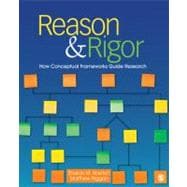
| Foreword | p. xi |
| Preface | p. xiii |
| About the Authors | p. xxi |
| Introduction | p. 1 |
| Conceptual Frameworks Explored and Defined | p. 6 |
| Defining and Situating Conceptual Frameworks: Concluding Thoughts | p. 14 |
| Why Conceptual Frameworks? | p. 15 |
| What (and Where) Is Theory? | p. 16 |
| The Many Levels of Theory: A Thought Experiment | p. 17 |
| Whose Theory Is It, and Where Does It Come From? | p. 19 |
| What Is a Literature Review, and What Is It for? | p. 21 |
| The Case for Conceptual Frameworks: Concluding Thoughts | p. 26 |
| Excavating Questions: Conceptual Frameworks and Research Design | p. 29 |
| "Excavating" Research Questions | p. 29 |
| About the Author | p. 30 |
| Background and Context: An Overview of the Work in Focus | p. 31 |
| Spillane, J. E (2002). "Local Theories of Teacher Change: The Pedagogy of District Policies and Programs" | p. 34 |
| The Argument | p. 39 |
| Conceptual Frameworks and Research Design | p. 42 |
| The Coevolution of Conceptual Frameworks and Research Design | p. 46 |
| Conceptual Frameworks and Research Design: Concluding Thoughts | p. 48 |
| The Role of the Conceptual Framework in Data Collection and Fieldwork | p. 51 |
| Who You Are, How You Think, and What You Study | p. 52 |
| About the Author | p. 53 |
| Background and Context: An Overview of the Work in Focus | p. 54 |
| Fine, M., & Sirin, S. R. (2007). "Theorizing Hyphenated Selves: Researching Youth Development in and Across Contentious Political Contexts" | p. 60 |
| The Argument | p. 65 |
| Hyphenated Selves as a Theoretical Framework | p. 67 |
| The Hyphen as Method: Positionality and Practice | p. 69 |
| Conceptual Frameworks and Fieldwork: Concluding Thoughts | p. 76 |
| Conceptual Frameworks and the Analysis of Data | p. 81 |
| Examining the Influence of an Ever-Emerging Conceptual Framework | p. 82 |
| About the Author | p. 82 |
| Background and Context: An Overview of the Work in Focus | p. 83 |
| Erickson, F. (1996). "Going for the Zone: The Social and Cognitive Ecology of Teacher-Student Interaction in Classroom Conversations" | p. 86 |
| The Argument | p. 95 |
| From Argument to Analysis | p. 97 |
| Transcription as Data Analysis | p. 98 |
| Evolving and Shifting Frameworks of Analysis | p. 101 |
| Conceptual Frameworks and Data Analysis: Concluding Thoughts | p. 105 |
| Expanding the Conversation, Extending the Argument: The Role of Conceptual Frameworks in Presenting, Explaining, and Contextualizing Findings | p. 107 |
| About the Author | p. 109 |
| Background and Context: An Overview of the Work in Focus | p. 109 |
| Being in Conversation With Theory: Influences on Thought and Action | p. 111 |
| Spencer, M., Dupree, D., & Hartmann, T. (1997). 'A Phenomenological Variant of Ecological Systems Theory (PVEST): A Self-Organizational Perspective in Context" | p. 113 |
| The Argument | p. 124 |
| Presenting and Discussing Findings | p. 126 |
| Using Findings to Contextualize and Extend the Argument | p. 127 |
| Learning From Surprises: How Findings | p. 126 |
| Reshape Conceptual Frameworks | p. 129 |
| Conclusion | p. 132 |
| The Conceptual Framework as Guide and Ballast | p. 135 |
| Developing a Conceptual Framework | p. 142 |
| Starting Points: Self and Audience | p. 143 |
| Making-and Breaking-Your Plans | p. 145 |
| The Conversation: From Listening to Speaking | p. 146 |
| Strategies and Exercises for Developing Conceptual Frameworks | p. 147 |
| Identifying Your Interests, Beliefs, and Motivations for Doing Research | p. 148 |
| Examination of the "Conversations Already Happening" | p. 148 |
| Ongoing Questions and Concerns About the Research | p. 149 |
| Concept Maps | p. 151 |
| Research Memos | p. 153 |
| Research Journal | p. 156 |
| Reason & Rigor | p. 158 |
| References | p. 161 |
| Author Index | p. 167 |
| Subject Index | p. 171 |
| Table of Contents provided by Ingram. All Rights Reserved. |
The New copy of this book will include any supplemental materials advertised. Please check the title of the book to determine if it should include any access cards, study guides, lab manuals, CDs, etc.
The Used, Rental and eBook copies of this book are not guaranteed to include any supplemental materials. Typically, only the book itself is included. This is true even if the title states it includes any access cards, study guides, lab manuals, CDs, etc.